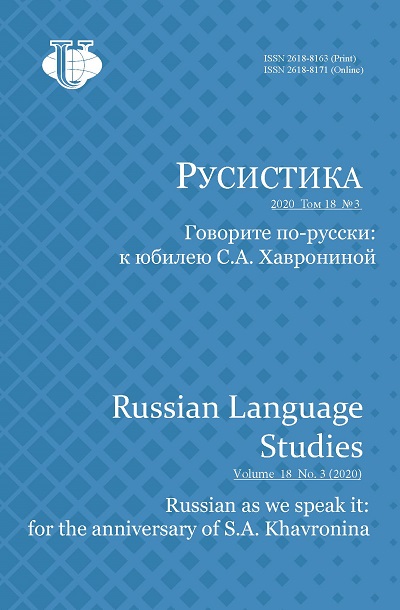Развитие представлений о методе обучения в дидактике и лингводидактике
- Авторы: Московкин Л.В.1
-
Учреждения:
- Санкт-Петербургский государственный университет
- Выпуск: Том 18, № 3 (2020): ГОВОРИТЕ ПО-РУССКИ: К ЮБИЛЕЮ С.А. ХАВРОНИНОЙ
- Страницы: 295-314
- Раздел: Методика преподавания русского языка как иностранного
- URL: https://journals.rudn.ru/russian-language-studies/article/view/24498
- DOI: https://doi.org/10.22363/2618-8163-2020-18-3-295-314
- ID: 24498
Цитировать
Полный текст
Аннотация
Исследование развития представлений о методе обучения в дидактике и лингводидактике значимо для преподавателей русского языка как иностранного (РКИ), так как показывает процесс эволюции научной мысли, позволяет лучше понять ее современное состояние и прогнозировать ее научные перспективы. Оно способствует построению современного варианта теории методов обучения, имеющей не только теоретическое, но и очевидное практическое значение. Цель исследования - описать процесс развития представлений о методе обучения в дидактике и лингводидактике, выделить его этапы, наметить перспективы дальнейших исследований в области теории методов обучения РКИ. Материалом исследования послужили около 80 теоретических работ и практических пособий для учителей в области дидактики и лингводидактики, в том числе и для преподавателей русского языка как иностранного. В ходе исследования использовались методы понятийного и контекстуального анализа, историко-описательный метод. В результате изучения источников были выявлены три этапа развития представлений о методе обучения в дидактике и лингводидактике. На этапе зарождения представлений о методе обучения (XVII-XIX вв.) данное понятие не определялось и не анализировалось, однако термин «метод обучения» активно использовался, обозначая как целостное видение процесса обучения, так и проект действий учителя на уроке. На этапе становления научных представлений о методе обучения (ХХ в.) проходило накопление эмпирических данных и осуществлялись различные их интерпретации. Был предложен ряд определений и классификаций метода обучения, создан ряд вариантов теории методов обучения. На этапе критического переосмысления накопленных данных (XXI в.) формируется новый вариант теории методов обучения, основу которого составляют описания существенных признаков понятия «метод обучения», функциональная классификация методов обучения и рекомендации по выбору или конструированию метода обучения. Выявлен основной фактор, препятствующий построению такой теории, - многозначность термина «метод обучения». Преодоление этой многозначности будет вкладом не только в дидактику и лингводидактику, но и в методику преподавания русского языка как иностранного.
Об авторах
Леонид Викторович Московкин
Санкт-Петербургский государственный университет
Автор, ответственный за переписку.
Email: l.moskovkin@spbu.ru
доктор педагогических наук, профессор, профессор кафедры русского языка как иностранного и методики его преподавания
Российская Федерация, 119034, Санкт-Петербург, Университетская наб., 7/9Список литературы
- Автухов И. Общие методы школьной работы. М.: Работник просвещения, 1928. 136 с.
- Алексюк А.Н. Развитие теории общих методов обучения в советской педагогике: автореф. дис. … д-ра пед. наук. Киев, 1973.
- Бабанский Ю.К. Методы обучения в современной общеобразовательной школе. М.: Просвещение, 1985. 208 с.
- Верзилин Н.М. Об определении и классификации методов обучения // Советская педагогика. 1957. № 8. С. 85-98.
- Владиславлев М.И. Логика. СПб.: Тип. В. Демакова, 1972. 365 с.
- Всесвятский Б.В. Метод исканий (исследовательский) и новые программы // На путях к новой школе. 1924. № 4-5. С. 5-19.
- Вятютнев М.Н. Теория учебника русского языка как иностранного. М.: Русский язык, 1984. 144 с.
- Голант Е.Я. Методы обучения в советской школе. М.: Учпедгиз, 1957. 152 с.
- Гугель Е.О. Метода Жакото, изложенная для родителей и наставников. Ч. 1. СПб.: Тип. К. Вингебера, 1834. 21 с.
- Данилов М.А. К вопросу о методах обучения в советской школе // Советская педагогика. 1956. № 10. С. 87-101.
- Декарт Р. Рассуждение о методе для верного направления разума и отыскания истины в науках / пер. с фр. М. Скиада. М.: Изд-во «Э», 2015. 126 с.
- Евстафиев П.В. Начальные основания педагогики, методики и дидактики. Вып. 1. СПб.: Тип. А. Траншеля, 1879. 131 с.
- Есаджанян Б.М. О содержании термина «метод» // Русский язык в национальной школе. 1980. № 4. С. 18-24.
- Зайченко П.А. Методы обучения в советской политехнической школе. Томск: Изд-во Томского университета, 1956. 120 с.
- Казакевич В.М. Информационный подход к методам обучения // Педагогика. 1998. № 6. С. 43-47
- Капитонова Т.И., Щукин А.Н. Современные методы обучения русскому языку иностранцев. М.: Русский язык, 1979. 222 с.
- Лемберг Р.Г. Методы обучения в школе. Алма-Ата, 1958. 93 с.
- Лернер И.Я. Дидактические основы методов обучения. М.: Педагогика, 1981. 186 с.
- Лордкипанидзе Д.О. Принципы организации и методы обучения. 2-е изд. М.: Учпедгиз, 1957. 172 с.
- Ляховицкий М.В. Методика преподавания иностранных языков. М.: Высшая школа, 1981. 159 с.
- Рахманов И.В. Основные направления в методике преподавания иностранных языков в ХIХ-ХХ вв. М.: Педагогика, 1972. 318 с.
- Рубинштейн М.М. Основы общей методики. М.: МИР, 1927. 176 с.
- Рудакова И.А. Теория и практика методов обучения в современной дидактической интерпретации. Ростов-на-Дону: Изд-во Ростовского ун-та, 2004. 264 с.
- Руководство учителям первого и второго классов народных училищ Российской империи. СПб.: Типография Шнора, 1783. 114 с.
- Садовская И.Л. Методы обучения: мифы, заблуждения и реалии. Красноярск: КГПУ имени В.П. Астафьева, 2008. 228 с.
- Салистра И.Д. О некоторых методических терминах // Иностранные языки в школе. 1959. № 2. С. 55-64
- Саранцев Г.И. Метод обучения как категория методики преподавания // Педагогика. 1988. № 1. С. 28-34
- Шапоринский С.А. К вопросу о методах обучения // Советская педагогика. 1958. № 2. С. 116-122
- Шульман Н.М. Общие методы школьной работы // Педагогическая энциклопедия: в 3 т. Т. 1 / под ред. А.Г. Калашникова при участии М.С. Эпштейна. М.: Работник просвещения, 1929. С. 563-579
- Anthony E. Approach, Method and Technique // English Language Teaching. 1963. Vol. XVII. No. 2. Pp. 63-67
- Brown H.D. Teaching by Principles: An Interactive Approach to Language Pedagogy. New York: Addison Wesley Longman, Inc., 2001. 479 p
- Comenius J.A. Novissima linguarum methodus: La toute nouvelle méthode des langues / French translation by Honoré Jean; preface by Étienne Krotky; ed. by Gilles Bibeau, Jean Caravolas, Clare Le Brun-Gouanvic. Geneva - Paris: Librairie Droz, 2005. 506 p
- Kumaravadivelu B. The postmethod condition: Emerging strategies for second, foreign language teaching // TESOL Quarterly. 1994. Vol. 28. No. 1. Pp. 27-48
- Larsen-Freeman D. Techniques and Principles in Language Teaching. 2nd ed. Oxford: Oxford University Press, 2000. 252 p
- Richards J., Rodgers Y. Approaches and Methods in Second Language Classrooms. 2nd ed. Cambridge: Cambridge University Press, 2001. 278 p
Дополнительные файлы














